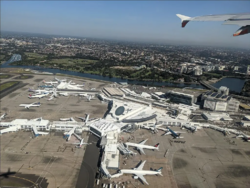Airport
(Place) | |
|---|---|
 | |
| A place were planes land and get loaded with passengers, and.... other nefarious cargo. |
An airport is a location from which flights take off and land. International airports provide useful venues for trying out social control measures, conditioning, surveillance technology and for data collection.
Contents
Standardisation
| Why US Airports Are So Bad - CNBC |
International airports have played a historical role in the global standardisation of surveillance and social control. Initially, this was centered on passengers transit across national borders, and involved passports, visas and customs checks. This has been developed into standardisation of products, such as suitcase locks (especially with the advent of the TSA), safety specifications, limits on capacities of batteries of laptops, cameras etc.
Universal surveillence
| Why Airport Security Is So Bad In The U.S - CNBC |
Airports have long had CCTV and Xray scanning of luggage. Since the "war on terror", surveillance has been dramatically extended, using the enemy image of "terrorism", to include microwave scanning of passengers, body heat detection (in connection with the SARS virus, in particular), collection of images including retinal scans, fingerprints, and DNA collection.
TSA
- Full article: TSA
- Full article: TSA
The TSA, rolled out after 9-11 is widely criticised for its contribution to the airport experience.
Propaganda
CNN Airport Network is a specifically tailored content designed to play at people waiting in airports.[1] Fox News reported that CNN paid US airports, on average, over $100,000/year, to show their output to waiting travellers.[2][3]
Customs
A editorial on the WSJ noted "Any effort to rebuild TSA and get airport security right in the U.S. has to start with two basic principles: First, the TSA's mission is to prevent a catastrophic attack on the transportation system, not to ensure that every single passenger can avoid harm while traveling. Much of the friction in the system today results from rules that are direct responses to how we were attacked on 9/11. But it's simply no longer the case that killing a few people on board a plane could lead to a hijacking. Never again will a terrorist be able to breach the cockpit simply with a box cutter or a knife. The cockpit doors have been reinforced, and passengers, flight crews and air marshals would intervene."[4]
Passports
ID Cards aren't really a problem for criminals to board planes according to the dozens of hijacks on 9-11 and the terror attacks in Europe during the 2010s has shown. Examples like the 2015-11 Paris attacks where all criminals were carrying suicide vests and IDs and not get caught by airport security have not been explained. Too many people board planes for 1 by 1 screening anyway, according to The Guardian, and there are always corrupt officials making official illegal passports.[5]
Other airports
Non passenger airports, such as those for the military, typically have much less scanning and monitoring technology. Some act as black sites for the illegal drug trade, notably Mena Arkansas.
Examples
| Page name | Description |
|---|---|
| Angel Fire | A hub of deep state guns and drug running in the 1980s, similar to Mena, Arkansas, but much less known. |
| Denver International Airport | Big Airport in the United States which has several "conspiracy theories" connected to it. |
| Heathrow | The main international airport serving London, UK. |
| Marana | IA airport in Arizona. Part of Iran Contra, and possible site where the 911 planes were made into drones. |
| Mena/Intermountain Municipal Airport | Center of drug trafficking in the 80s. |
| Ndola | |
| Schiphol Airport | Dutch main airport just south-west of Amsterdam, Illegal drug trade is a significant part of its cargo. |
| Venice Municipal Airport | Florida airport with a lot of deep state activities. |
References
- ↑ https://www.flyertalk.com/articles/why-do-airports-always-play-cnn.html
- ↑ https://www.foxnews.com/entertainment/growing-questions-about-cnns-airport-monopoly-as-network-veers-left
- ↑ https://files.catbox.moe/wpp8oy.mp4
- ↑ https://www.wsj.com/articles/SB10001424052702303815404577335783535660546
- ↑ https://www.theguardian.com/world/2022/jan/31/revealed-how-fake-passports-allow-is-members-to-enter-europe-and-us<M